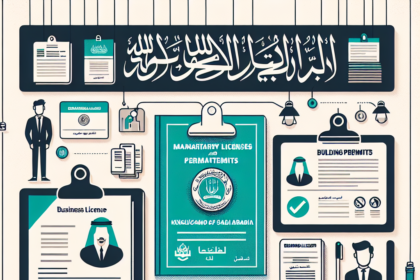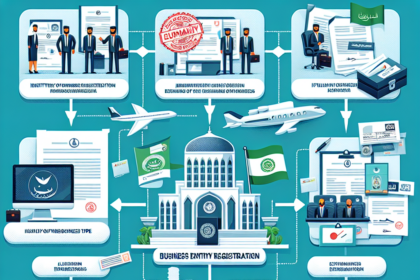Business Law in KSA
Comprehensive Guide to Business Law in KSA
Introduction to Business Law in KSA
Understanding business law in the Kingdom of Saudi Arabia (KSA) is crucial for entrepreneurs and investors. The Saudi legal framework combines Sharia law with modern regulations to create a robust environment for business operations.
Legal Structures for Businesses in KSA
Choosing the appropriate legal structure is a fundamental step in establishing a business in KSA. The most common structures include:
1. Limited Liability Company (LLC)
An LLC is the most popular business structure in KSA. It requires a minimum of two and a maximum of fifty shareholders. Shareholders’ liability is limited to their shares in the company, making it a secure and flexible option.
2. Joint Stock Company (JSC)
A JSC is ideal for larger enterprises. It allows for raising capital through public or private offerings. JSCs can be public, with shares traded on the stock exchange, or closed, with shares held by a limited group of investors.
3. Branch Office
Foreign companies can establish branch offices in KSA to conduct business without forming a separate legal entity. The parent company is fully liable for the branch’s activities. This structure is suitable for businesses looking to expand their presence in KSA.
4. Sole Proprietorship
A sole proprietorship is owned and operated by one individual. While it offers complete control, it also comes with unlimited personal liability for business debts. It is suitable for small-scale businesses and individual entrepreneurs.
5. Free Zone Entity
KSA offers special economic zones that provide tax incentives and 100% foreign ownership. Businesses operating in these zones benefit from simplified regulatory procedures and access to state-of-the-art infrastructure. Free zones are designed to attract foreign investment and promote trade.
Regulatory Environment
The regulatory environment in KSA is designed to support business growth while ensuring compliance with local laws. Key regulatory bodies include:
1. Ministry of Commerce and Investment (MCI)
The MCI oversees business registration, licensing, and regulation. It ensures that businesses comply with Saudi laws and regulations, promoting a fair and competitive market.
2. Saudi Arabian General Investment Authority (SAGIA)
SAGIA facilitates foreign investment by offering incentives and support to international businesses. It provides a range of services, including investment licensing and business setup assistance.
3. Saudi Industrial Property Authority (MODON)
MODON is responsible for developing and managing industrial cities and technology zones. It offers various benefits, including tax exemptions and infrastructure support, to businesses operating in these areas.
Commercial Contracts and Dispute Resolution
Contracts are the backbone of business transactions in KSA. Ensuring that contracts are legally binding and enforceable is critical for business success.
1. Governing Law
Commercial contracts should specify the governing law, which can be Saudi law or another jurisdiction, depending on the agreement between the parties.
2. Dispute Resolution
KSA offers various dispute resolution mechanisms, including litigation, arbitration, and mediation. The Saudi Center for Commercial Arbitration (SCCA) provides a platform for resolving commercial disputes efficiently and fairly.
Intellectual Property Protection
Protecting intellectual property (IP) is essential for businesses in KSA. The country has comprehensive IP laws to safeguard trademarks, patents, and copyrights.
1. Trademark Registration
Businesses must register their trademarks with the Saudi Authority for Intellectual Property (SAIP) to secure legal protection. Registered trademarks are protected for ten years and can be renewed indefinitely.
2. Patent Protection
KSA grants patents for inventions that are new, involve an inventive step, and are industrially applicable. Patents are valid for twenty years from the filing date, subject to annual maintenance fees.
3. Copyright Laws
Saudi copyright laws protect literary, artistic, and scientific works. Copyright protection lasts for the author’s lifetime plus fifty years, ensuring creators’ rights are upheld.
Compliance and Anti-Corruption
Compliance with local laws and regulations is crucial for maintaining good standing in KSA’s business environment. The National Anti-Corruption Commission (Nazaha) combats corruption, ensuring transparency and integrity in both public and private sectors.
Conclusion
Navigating business law in KSA requires a thorough understanding of the legal and regulatory framework. By choosing the right business structure, complying with regulations, and protecting intellectual property, businesses can thrive in Saudi Arabia’s dynamic market. Entrepreneurs and investors should stay informed and seek professional legal advice to navigate the complexities of the Saudi legal landscape effectively.










